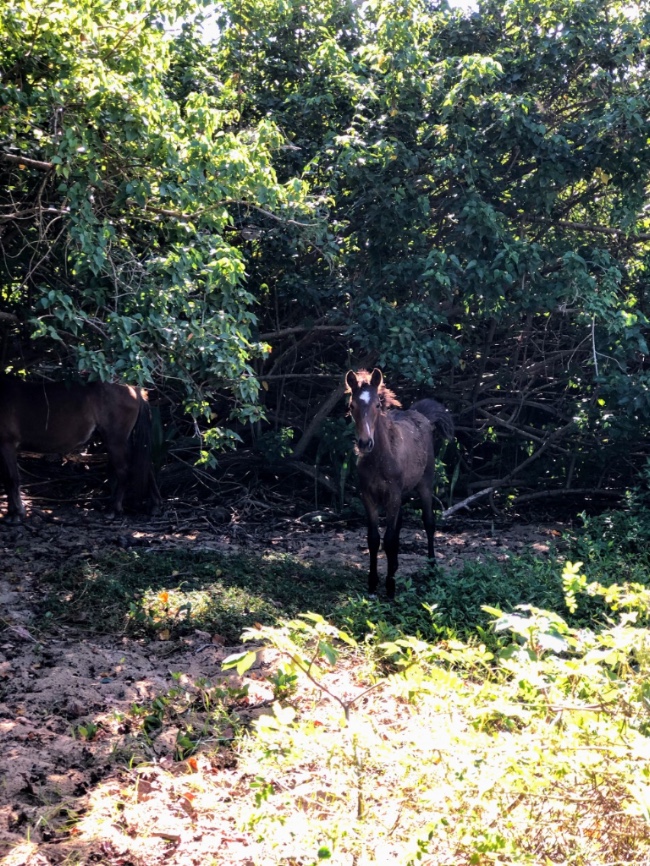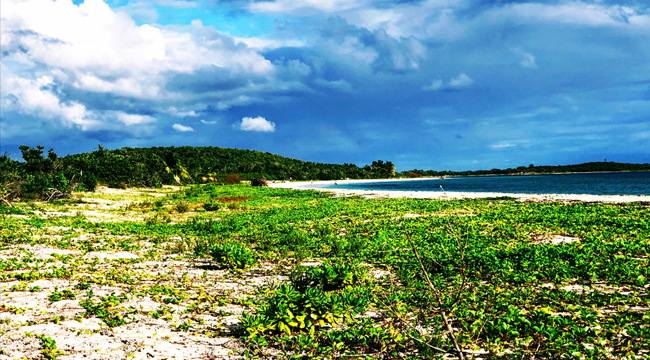
I’m sitting by a beautiful, sparkling pool, reading a novel. The sun is warm on my legs and, having just spent two weeks in the snowy midwest, it feels decadent as hell. The beach is just a few feet away — a small stretch of incredibly soft sand that gives way to the gentle crashing of clear, turquoise waves. It’s not officially private, but it might as well be. In the 48 hours we’ve been here I haven’t seen another soul, though I did see a group of wild horses grazing lazily near the shoreline.
Earlier in the day, I waded out in the Caribbean just to float – going further than I normally would, letting the draw of the tide envelop me. I’m not used to ocean water that feels so warm. I live in LA, where the water is always colder than the air, even in the heat of summer. By contrast, the Caribbean feels welcoming. As I floated, I had memories of my grandfather in the same ocean, swimming out toward the horizon. Time and again, he’d disappear and I’d stretch my neck — toes in the sand and pail of beach toys in hand — to track where he’d gone. Then he’d surface again, bobbing up from the waves with cold, raw seaweed in his hands.
“Want some, it’s delicious?” he’d ask.
“No, abuelo,” I’d reply.
Being back in Puerto Rico surfaces all sorts of memories like this. My dad was born here, but my grandparents moved the family to New York when he was a kid. Which makes me one of the five million people of Puerto Rican descent who lives on the mainland. Growing up in the midwest, we went to Puerto Rico every few years, but it always felt like summer vacation. Years have passed since the last time I visited, at 17.
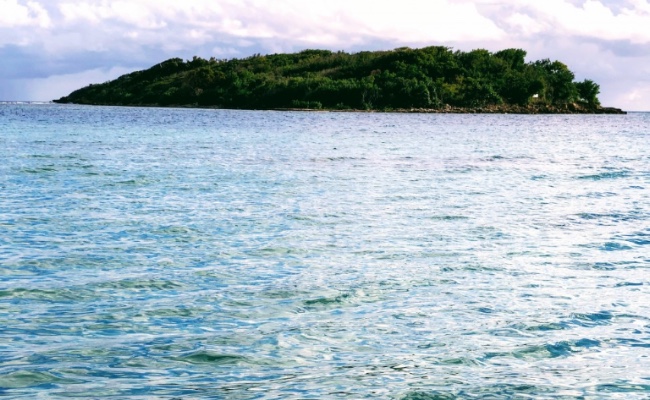
When Hurricane Maria hit, I was glued to my TV and phone. I watched the government response. I saw people — my people — suffering and I felt called to go back. This wasn’t just the longing of a tourist. It was about being a daughter of the Puerto Rican diaspora, eager to help my home.
The desire to be a part of the rebuilding effort was high, but I didn’t have months to go volunteer. I don’t have tons of extra cash lying around to donate either. So I decided to help in a simpler way (which also gave me a vacation and reconnected me to my homeland) — by taking a trip. Simply by the act of being a tourist and spending money while visiting areas that are less trafficked or less wealthy, I was able to feel like I was a part of a solution.
This isn’t just self-justifying nonsense. Puerto Rico relies on tourism. One way to help the island post-hurricane is to go visit.
I knew that I wanted to go to places in Puerto Rico that get less tourism than San Juan (though San Juan is amazing), so my partner and I decided to head to Vieques, an island about seven miles off the coast. Like the main Puerto Rican island, Vieques was hit hard by the hurricane. But its buildings were less solid and its infrastructure less robust. While power was restored to the rest of Puerto Rico this fall, Vieques was still running the entire island off of generators. It wasn’t until this winter that power was restored fully. Even now, the main clinic in Vieques is no longer operational and many of its 9000 residents have to go off the island for medical care.
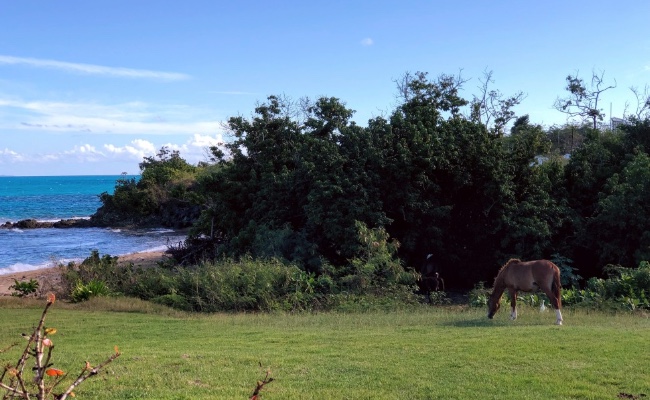
We drive an hour from San Juan to Ceiba to catch the ferry to Vieques. Arriving at the dock, we pay our $2.50 and then wait under a tent, eating burritos. I scan the other tourists heading to the island. About half of the ferry takers seem to be locals, no baggage, returning from a day trip to the mainland. The other half are young backpackers. There’s an adventurous feel to this trip, it’s on the radars of people who want to get off-the-beaten-path.
The ferry is quick. Less than half an hour and we’re at one of Vieques’s two main towns, Isabel II, where we rent a jeep to explore. Map in hand, we’re off, stopping at the main grocery store to get some staples before heading to the house we rented — a villa on the property of the W hotel. Well… what was the W Hotel. The luxury resort, the largest hotel on the island with 156 rooms, has not reopened. It’s boarded up and, still over a year later, abandoned. When and if the hotel will repair the damage and open again is anybody’s guess.
As we drive, we’re stopped by a wild horse crossing the road. I squeal. This is the first horse I see, but it will not be the last — the beautiful creatures are everywhere. They trot by themselves, graze in groups, and gallop bareback while being ridden by a teenager down the middle of the main town’s street. Wild horses, we quickly learn, are part of the fabric of the island. We arrive at the W entrance and a security guard lets us into the property.
It’s a bit eerie at first, the empty buildings that once bustled with tourists and activities. But that feeling evaporates when we get to the house we’re staying in, at the edge of the property. The villa has been redone since the hurricane, the owner, Rene, tells me when we talk on the phone before my arrival. I tell him I’m a writer there to see the island’s recovery. He gets excited, immediately throwing out suggestions for restaurants and activities, friends that he knows, businesses I should patronize.
“People need to know they should come here,” he tells me. “We’re ready.”
The house is undeniably beautiful, sleek, modern, and the view is insane. Glancing out glass doors, there’s a tranquil pool and, beyond that, the beach. And it’s entirely ours for a couple of nights. “This is paradise,” I think. As I walk outside, I glance at another house, windows boarded up and that eerie feeling hits me again.
This is the strange juxtaposition of Vieques after the hurricane, the shuttered restaurants next to thriving ones. The lush greenery that gives way to huge abandoned structures or former military outposts, cement being overtaken by the jungle. Reclaimed.
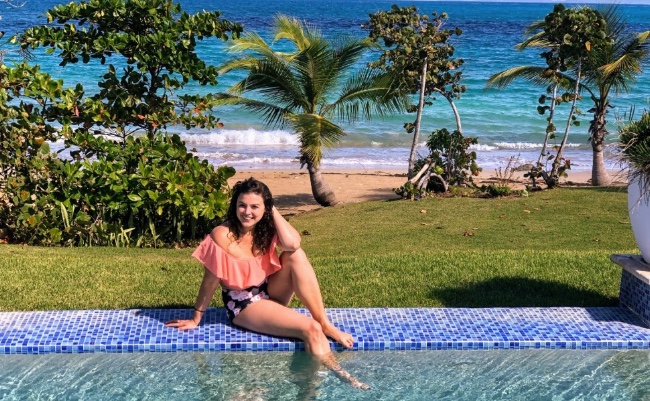
We decide to go back into town for dinner to try the suggested, Bieke’s Bistro, for authentic Puerto Rican food. I’m charmed by the little place. It seems to run in that island way — things are slow, sure, but where do we have to be? The little restaurant has writing all over the walls, and political art cartoons in frames, making commentary on the U.S. Navy’s former presence on the island.
We order pork mofongo, chicken arepas, and arroz con habichuelas with platinos. The rice is incredibly flavorful, probably the best I’ve tasted in all of Puerto Rico. The mofongo is amazing, and I would marry the chicken arepa, the chicken is seasoned in a sauce with Puerto Rican flavor that mixes perfectly with the South American style bread. Seriously, I. Would. Marry. It.
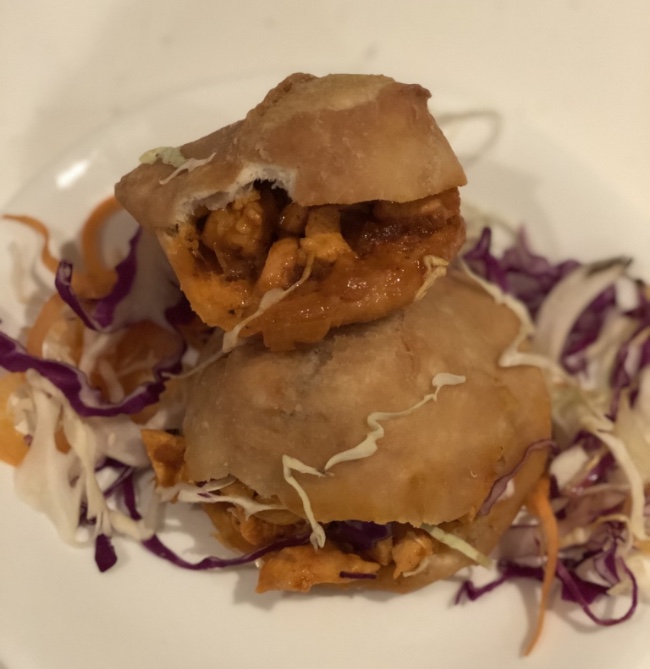
The next day we spend time by the pool and enjoy the small beach to ourselves before venturing out to explore. It doesn’t take long to get from one side of Vieques to the other, it’s less than five miles. We head to the beaches on the south side of the island. We heard they’re some of the best in the world. And despite that bold claim, they do not disappoint. Playa La Chiva, where we decide to camp out for the afternoon, seems untouched, the way you’d imagine a deserted island. Palm trees on the edge and then just the greenest vines snaking around the sand, a stunning contrast to the white sand and clear water refracting about a million kinds of teal.
Every few minutes, we marvel at how few people there are on this long stretch of beach. Just small smatterings of travelers here and there, a group of guys throwing a football in the water, a small group with drinks sitting on a mound of sand, a couple flying a drone over the water. It’s peaceful.
As afternoon fades to evening, we reluctantly leave the beach, tanned and happy, to head to the other town on the island, Esperanza, with its twinkling lights lining the street. Unlike the sleepier, Isabel II, this is where the busier bars, restaurants, and hostels are. People stroll down the promenade and sip frozen drinks on patios. We go to Duffy’s for food and to hang. There’s both an energy and a laidback feel to it all. This is where the nightlife is, and it’s more bustling than I expected.
There’s a sense of hopefulness to this little town, the hope that tourism is returning. Money is being made. People are having fun and the symbiotic tourism town/tourist relationship seems to be re-finding its footing.
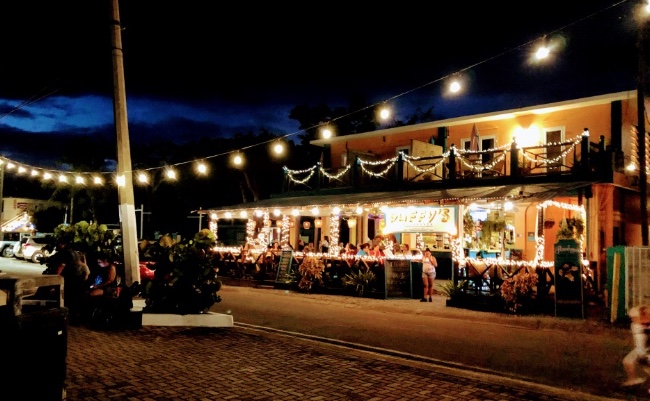
The next morning, I wake up early and stand on the beach dipping my toes into the ocean. I’m alone. Well, save for a brown horse with a black mane and soulful eyes (who makes it very clear I am not to approach him). I can’t help but think of all the beaches in the world that are overcrowded, filled with tourists, where you fight for a stretch of sand large enough to lay a towel. Here in Vieques, there are pristine empty stretches of playa, great food, and the brightest bioluminescent bay in the world. If you’re from the U.S., you don’t even need a passport.
As I stand there, not ready to leave, I feel baffled that more people aren’t visiting. That the best use of a luxury resort is to shutter it. How else does an island that relies on tourism for its economy recover if we don’t all go to support it?
We head to the ferry, which was so prompt before. This time though, it’s three hours late. I stroll up the hill, back into Isabel II, to the panderia for a pressed ham and cheese sandwich with bread that practically melts in my mouth. A rooster walks by while we eat.
This is the speed of the little island. Sometimes, the food takes a while to make or the ferry comes when it chooses. I haven’t had the internet once. But there’s also fresh seafood, wild horses, pristine beaches, and charming patios to relax on. It’s what you dream of when you think “tropical vacation.” For me, there’s also an element that feels like returning home.
Vieques is still recovering. It will still be recovering for a long while. But the small trade-offs to visit seem minor compared to what the island gives us in return. Visiting Vieques may be a way for a traveler to do good while traveling, choosing to spend money in a place that needs that support. If you’re looking for true value on your adventures, you couldn’t ask for a better deal than that.
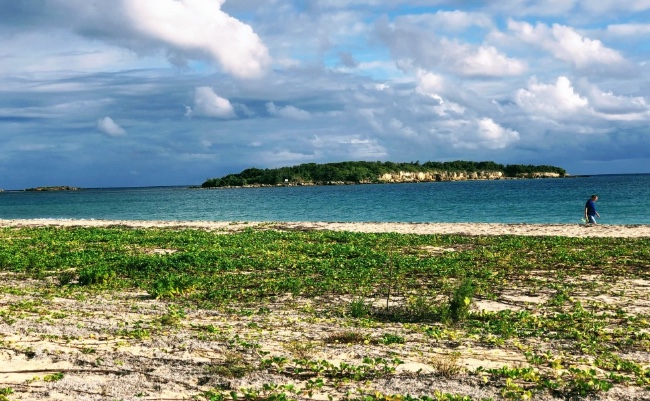
https://www.instagram.com/p/BTsbASul6lw/
